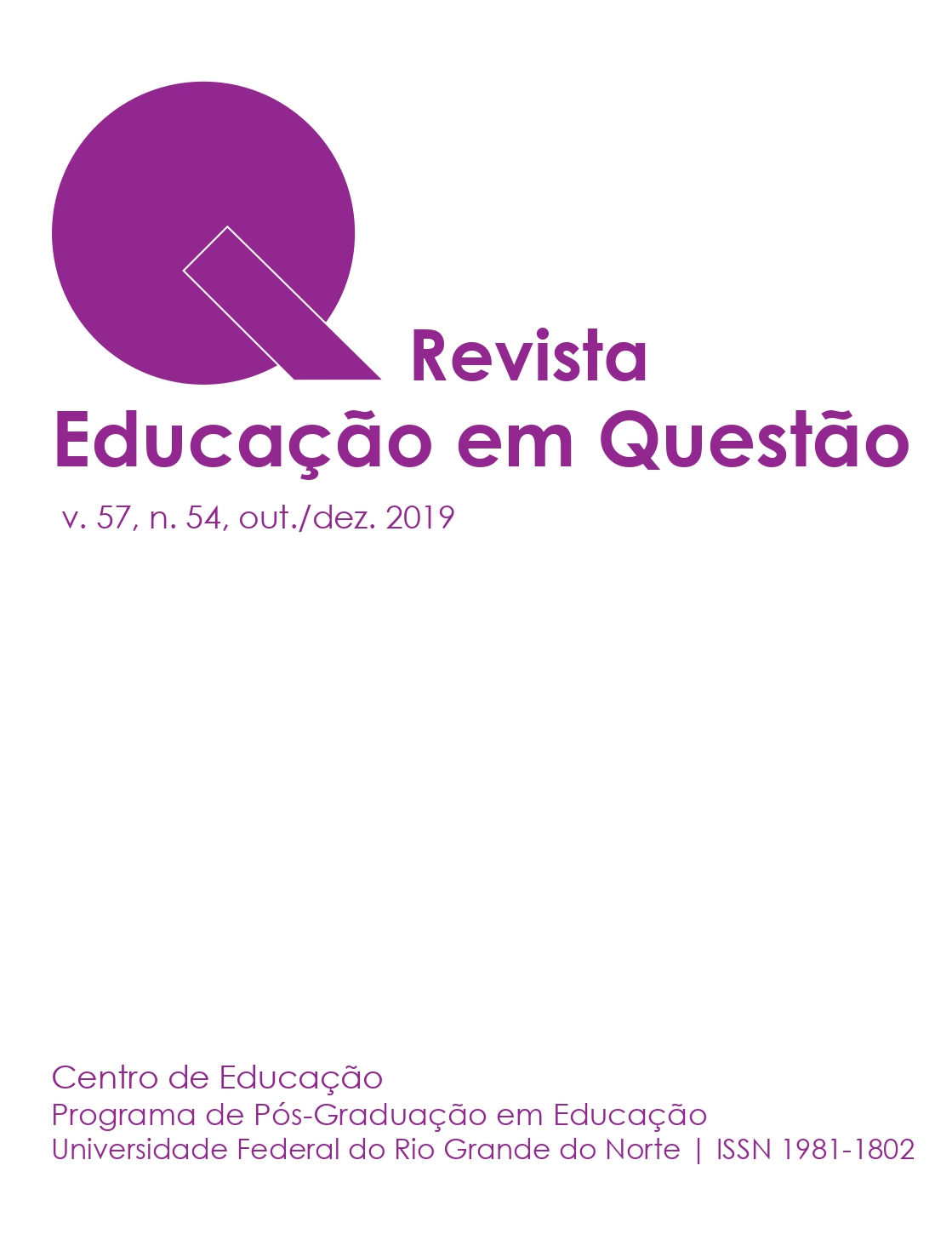What the Tembé indigenous teachers say about school education and the future of the village:
a study of their representations
DOI:
https://doi.org/10.21680/1981-1802.2019v57n54ID17728Keywords:
Indigenous school education. Identity. Social representations. Future.Abstract
The present study is part of the research carried out with Tembé indigenous teachers in the upper Rio Guamá indigenous land. In this article we analyze what the Tembé professors say about the school education of their people and the implications in the future of the village. To do so, we applied the social representations theory (SRT) from Moscovici. The data collection instrument was the narrative interview and the selection of the subjects followed the previously defined criteria. The treatment and analysis of the data followed the references of the TRS, thus, we seek to the grouping of the data by the units of senses and the elaboration of corresponding themes. Among the results we highlight that the social representations of Tembé teachers about the school education of their people are objected and anchored to a large extent in a in a non-indigenous school curriculum. In this way, the future is threatened, mainly, by the mother tongue and traditional indigenous rites.
Downloads
References
BARDIN, Laurence. Análise de conteúdo. Lisboa: Edições 70, 2010.
BRASIL. Lei 6.001 de 19 de dezembro de 1973. Dispõe sobre o Estatuto do Índio. Disponível em: http://www.planalto.gov.br/ccivil_03/LEIS/L6001.htm. Acesso em 27 de jul. 2018.
______. Lei nº 9394, de 20 de dezembro de 1996. Estabelece as diretrizes e bases da educação nacional. Disponível em: http://www.planalto.gov.br/ccivil_03/Leis/L9393.htm. Acesso em: 30 out. 2017.
______. RCNEI - Referencial Curricular Nacional para as Escolas Indígenas. Brasília: MEC/SEF. 1998.
______. Plano de gestão territorial e ambiental da Terra Indígena do Alto Rio Guamá: povo Tembé Tenetehar da terra indígena Alto Rio Guamá. Brasília: 2018.
COHN, Clarice. Educação escolar indígena: para uma discussão de cultura, criança e cidadania ativa. Revista Perspectiva, Florianópolis, v. 23, n. 2, p. 485-515, jul./dez. 2005. Disponível em: https://periodicos.ufsc.br/index.php/perspectiva/article/download/9804/9038. Acesso em: 30 ago. 2018.
FREIRE, Paulo. Pedagogia do Oprimido. Rio de Janeiro: Paz e Terra, 1987.
HALL, Stuart. A identidade cultural na pós-modernidade. Rio de Janeiro: DP&A, 2006.
IBGE - Instituto Brasileiro de Geografia e estatística. Censo demográfico 2010. 2010. Disponível em: https://censo2010.ibge.gov.br/resultados.html. Acesso em: 10 mar. 2017.
JODELET, Denise. O movimento de retorno ao sujeito e a abordagem das representações sociais. Sociedade e Estado, Brasília, v. 24, n. 3, p. 679-712, set./dez. 2009. Disponível em: http://www.scielo.br/pdf/se/v24n3/04.pdf. Acesso em: 25 mar. 2018.
MARRA, Maria Lúcia Martins Pedrosa. “Escola itinerante”: uma experiência de formação de professores indígenas no estado do Pará, Brasil. 2015, 291f. (Tese de Doutorado) - Programa de Pós-Graduação em Educação, Universidade Federal do Pará, 2015.
MAROLDI, Alexandre Masson. A produção científica sobre educação indígena no Brasil: uma revisão narrativa.
RIAEE – Revista Ibero-Americana de Estudos em Educação, Araraquara, v. 13, n. 3, p. 931-952, jul./set., 2018. Disponível em: https://periodicos.fclar.unesp.br/iberoamericana/article/viewFile/10211/7458. Acesso em: 24 mar. 2019.
MIRANDA, Júlia Cleide Teixeira de. O ritual da festa do moqueado na sociedade indígena Tembé-Tenetehara: teias e tramas de saberes. In: XII CONGRESSO NACIONAL DE EDUCAÇÃO - EDUCERE. 10, 2015. Curitiba. Anais [...]. Curitiba: Pontifícia Universidade Católica do Paraná. Online. Disponível em: http://educere.bruc.com.br/arquivo/pdf2015/19426_11546.pdf. Acesso em: 02 abr. 2018.
MOSCOVICI, Serge. Representações sociais: investigações em psicologia social. Rio de Janeiro: Vozes, 2015.
MUYLAERT, Camila Junqueira; SARUBBI JR., Vicente; GALLO, Paulo Rogério; ROLIM NETO, Modesto Leite; REIS, Alberto Olavo Advincula. Entrevistas narrativas: um importante recurso em pesquisa qualitativa. Rev. Esc. Enferm. USP, n. 48 (Esp2), p. 193-199. 2014. Disponível em: http://www.scielo.br/pdf/reeusp/v48nspe2/pt_0080-6234-reeusp-48-nspe2-00184.pdf. Acesso em: 10 ago. 2018.
NASCIMENTO, Ivany Pinto. O campo das representações sociais: articulações possíveis. Agália - Revista de Estudos na Cultura. nº 107. pag. 181-203, 2014.
______. A identidade da Teoria das Representações Sociais. Revista Ver a Educação. Vol. 10, n.1 e 2, Jan/Dez. 2004.
______. Educação e projeto de vida de adolescentes do ensino médio. EccoS – Revista Científica, São Paulo, n. 31, p. 83-100, mai/ago. 2013. Disponível em: http://www.redalyc.org/pdf/715/71529334006.pdf. Acesso em: 04 abr. 2019.
PEREIRA FILHO, Gerson; PINTO, Alírio Ferreira. “De selvagem a cidadão”: representações sociais do índio no ensino fundamental. Sapere aude, Belo Horizonte, v. 8, n. 15, p. 128-145, Jan./jun. 2017. Disponível em: http://periodicos.pucminas.br/index.php/SapereAude/article/download/P.2177-6342.2017v8n15p128/12030. Acesso em: 30 mar. 2019.
PROFFESSOR P1. Entrevista. Aldeia São Pedro (Pará), 14 setembro. 2018.
PROFFESSOR P2. Entrevista. Aldeia São Pedro (Pará), 14 setembro. 2018.
PROFFESSOR P3. Entrevista. Aldeia Itwaçu (Pará), 7 dezembro. 2018.
PROFFESSOR P4. Entrevista. Aldeia Itwaçu (Pará), 7 dezembro. 2018.
SANTOS, Antônio Luís Parlandin dos. Representações sociais de professores do ensino fundamental sobre educação étnico-racial e as implicações em sua prática pedagógica: por uma pedagogia decolonial e intercultural. 2018, 282f. (Tese de Doutorado) – Programa de Pós-Graduação em Educação, Universidade Federal do Pará, 2018.
TEIXEIRA-PINTO, Márnio. Ieipari: Sacrifício e Vida Social Entre Os Índios Arara. Rio de Janeiro: Hucitec, 1997.
WALSH, Catherine. Interculturalidade crítica e pedagogia decolonial: in-surgir, re-existir e re-viver. In: CANDAU, Vera Maria Ferrão (org.). Educação Intercultural na América Latina: entre concepções, tensões e propostas. Rio de Janeiro: 7 letras, 2009.
Downloads
Published
How to Cite
Issue
Section
License
The Journal Education in Question shall retain the copyright in all articles that it publishes.
The authors and co-authors of articles and book reviews, published in the Journal Education in Question, shall wait for at least 1 (one) year before they are allowed to submit new works for publication.






